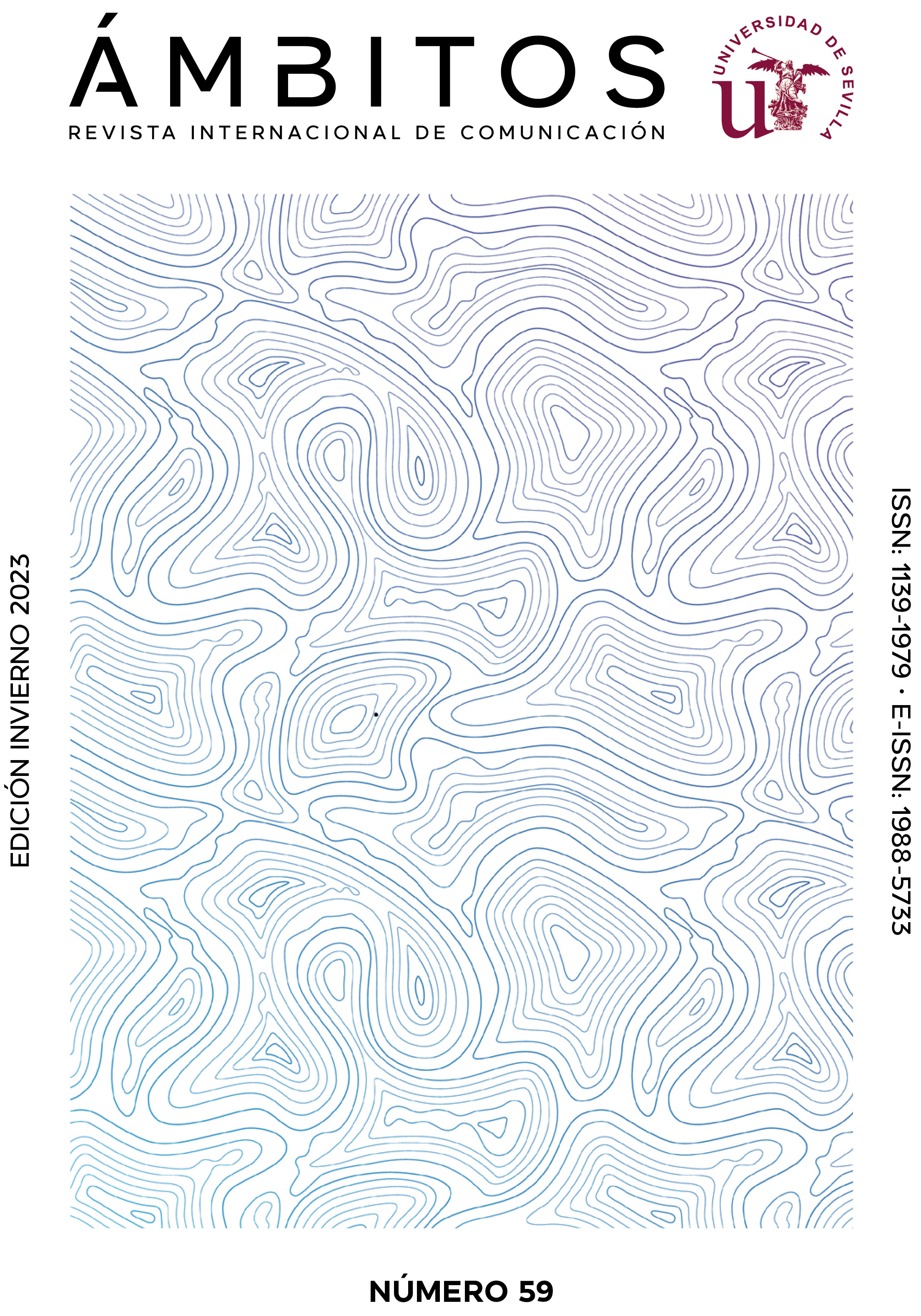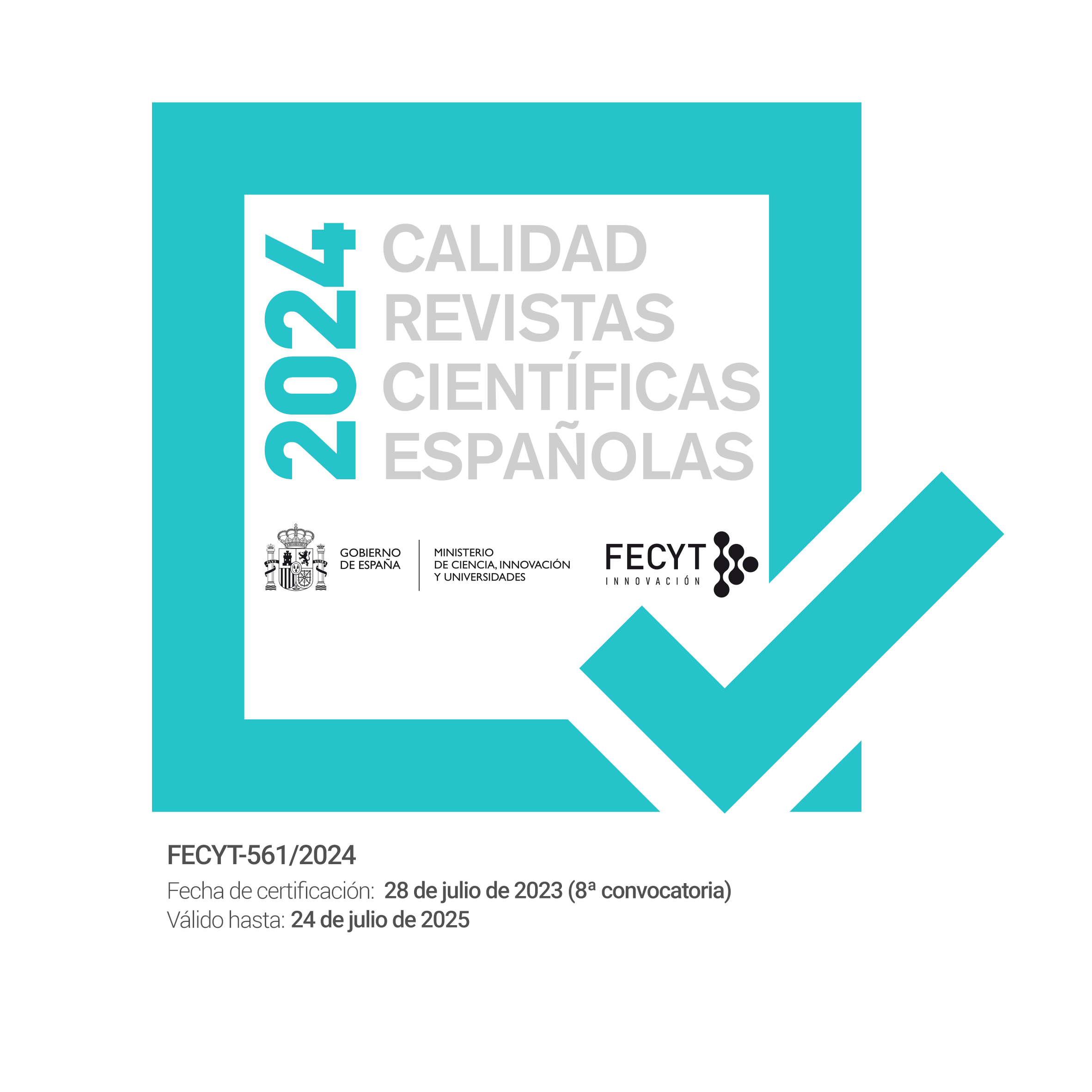Entre el «cara a cara» y la multiplicidad de candidatos: el debate electoral televisado en Europa (2019 – 2022)
DOI:
https://doi.org/10.12795/Ambitos.2023.i59.09Palabras clave:
comunicación política, debate electoral, campaña electoral, Europa, televisiónResumen
El debate televisivo es el momento más importante de una campaña electoral, un acto de comunicación política que genera gran cantidad de información y permite observar las cualidades de los líderes políticos. El actual concepto de debate mediático nace en Estados Unidos con el enfrentamiento por televisión entre Nixon y Kennedy en 1960, marcando un antes y un después en la comunicación política y en la historia de estos eventos mediáticos. Los debates electorales en Europa comenzaron paralelamente a los casos estadounidenses. Suecia fue la pionera en 1958, seguida de otros países como Alemania en 1969, Francia en 1974 o Italia en 1983; el primer debate electoral español aparece en 1993 entre Felipe González y José María Aznar. Reino Unido incorporó el debate televisado en 2010, convirtiéndose en uno de los países con menos tradición en este ámbito. Para conocer las principales características del debate electoral europeo, el presente trabajo de investigación analiza un total de 119 debates celebrados entre enero de 2019 y junio de 2022, todos ellos se emitieron en 18 países miembros de la Unión Europea, incluido Reino Unido. Tras la aplicación del análisis de contenido, los datos recopilados demuestran cómo los debates en Europa con dos candidatos son levemente superiores sobre aquellos donde existen más participantes políticos. Este estudio observa que el debate europeo todavía se encuentra entre el modelo «cara a cara» y un formato basado en la presencia de un número mayor de protagonistas.
Los debates electorales en Europa comenzaron paralelamente a los casos estadounidenses. Suecia fue la pionera en 1958, seguida de otros países como Alemania en 1969, Francia en 1974 o Italia en 1983; el primer debate electoral español aparece en 1993 entre Felipe González y José María Aznar. Reino Unido incorporó el debate televisado en 2010, convirtiéndose en uno de los países con menos tradición en este ámbito.
Para conocer las principales características del debate electoral europeo, el presente trabajo de investigación analiza un total de 119 debates celebrados entre enero de 2019 y junio de 2022, todos ellos se emitieron en 18 países miembros de la Unión Europea, incluido Reino Unido. Tras la aplicación del análisis de contenido, los datos recopilados demuestran cómo los debates en Europa con dos candidatos son levemente superiores sobre aquellos donde existen más participantes políticos. Este estudio observa que el debate europeo todavía se encuentra entre el modelo “cara a cara” y un formato basado en la presencia de un número mayor de protagonistas.
Descargas
Citas
Abela, J. A. (2002). Las técnicas de análisis de contenido: una revisión actualizada. [Archivo pdf].
https://bit.ly/3TWc6to
Abramowitz, A. I. (1978). The Impact of a Presidential Debate on Voter Rationality. American Journal of Political Science, 22(3), 680–690.
https://doi.org/10.2307/2110467
Aigneren, M. (2009). Análisis de contenido. Una introducción. La Sociología En Sus Escenarios, 3.
https://bit.ly/3DxHPf0
Bailey, R. (2020). Planets Seldom Align: A Hit and the Misses of United Kingdom Television Election Debates. En J. Juárez-Gámiz, C. Holtz-Bacha & A. Schroeder (Eds.), Routledge International Handbook On Electoral Debates (pp.119-127). Routledge.
https://doi.org/10.4324/9780429331824-16
Barrientos, A., Caldevilla, D. y Vargas, J. (2019). El protocolo, la puesta en escena y la persuasión en los debates políticos televisados. Redmarka. Revista de Marketing Aplicado, 23(3), 17-27.
https://doi.org/10.17979/redma.2019.23.3.5872
Burgal Jiménez-Mena, J. R. (2013). Análisis de los debates de las campañas electorales de 2008 y 2011 en España [Trabajo Fin de Máster, Universidad de Sevilla] Depósito de investigación US. https://bit.ly/3DcLNZ4
Canel, M. J. (1998). Los efectos de las campañas electorales. Communication & Society, 11(1), 47-67.
https://doi.org/10.15581/003.11.36422
Canel, M. J. (2001). Comunicación política: técnicas y estrategias para la sociedad de la información. Tecnos.
Castromil, A. y Rodríguez, R. (2019). «Del «cara a cara» a los debates «a cuatro» en España». En E. Conde-Vázquez, J. Fontenla-Pedreira y J. Rúas-Araújo (Eds.), Debates electorales televisados: del antes al después (pp.27-47). Cuadernos Artesanos de Comunicación. https://bit.ly/3WzeMP7
Chihu-Amparán, A. (2021). Frames de la comunicación. Los debates presidenciales en México 2018. Inter disciplina, 10(26), 241-265.
Crespo, I., Carletta, I., Garrido, A. y Riorda, M. (2011). Manual de comunicación política y estrategias de campaña: candidatos, medios y electores en una nueva era. Editorial Biblos.
Delle-Done, F. (2015, 6 de octubre). Debate electoral en Alemania (1): la ronda de los elefantes. Eleccionesenalemania.com. https://bit.ly/3N9XAMt
Eberl, J. M., Kathirgamalingam, A. y Boomgaarden, H. G. (2020). Austria: On the Road to Peak TV Debate? En J. Juárez-Gámiz, C. Holtz-Bacha & A. Schroeder (Eds.), Routledge International Handbook On Electoral Debates (pp. 129-138). Routledge.
https://doi.org/10.4324/9780429331824-17
Galindo, F. y Regueira J. (2019). En el exoesqueleto: La preproducción de la campaña electoral. En Conde-Vázquez, J. Fontenla-Pedreira y J. Rúas-Araújo (Eds.), Debates electorales televisados: del antes al después (pp. 49-65). Cuadernos Artesanos de Comunicación. https://bit.ly/3PFCSFB
Gallego-Reguera, M. (2016). El regreso del cara a cara en España: la organización profesional de los debates electorales televisados entre candidatos a la presidencia del gobierno en 2008. [Tesis doctoral, Universidad Complutense de Madrid]. Repositorio Institucional UCM. https://bit.ly/3U361eQ
García-Marín, J. (2015). La cobertura mediática de los debates electorales en España. Revista Española De Ciencia Política, 38, 135-161. https://bit.ly/3WcdNoG
Grbeša, M. (2020). Televised Debates in Croatia: Lost in Regulation. En J. Juárez-Gámiz, C. Holtz-Bacha & A. Schroeder (Eds.), Routledge International Handbook On Electoral Debates (pp. 167-174). Routledge.
https://doi.org/10.4324/9780429331824-21
Håkansson, N. y Johansson, B. (2020). Swedish Election Debates: A Long Tradition Adapting to New Times. En J. Juárez-Gámiz, C. Holtz-Bacha & A. Schroeder (Eds.), Routledge International Handbook On Electoral Debates (pp. 139-146). Routledge.
https://doi.org/10.4324/9780429331824-18
Herrero, J. C. y Benoit, W. L. (2009). Análisis funcional de los debates en las elecciones generales de 2008. Zer: Revista de estudios de comunicación/Komunikazio ikasketen aldizkaria, 27, 61-81. https://bit.ly/3TE448K
Holtz-Bacha, C. (2020). From the Heavyweights’ Debate to the Duel: The Development of Television Debates in Germany. En J. Juárez-Gámiz, C. Holtz-Bacha & A. Schroeder (Eds.), Routledge International Handbook On Electoral Debates (pp. 147-155). Routledge.
https://doi.org/10.4324/9780429331824-19
Juárez-Gámiz, J. (2021). Los debates electorales en la democracia contemporánea. Apuntes para analizar su presencia, función y evolución en las campañas. Instituto Nacional Electoral.
Kaal, H. (2014). De cultuur van het televisiedebat-Veranderende percepties van de relatie tussen media en politiek, 1960-heden. Tijdschrift voor geschiedenis, 127(2), 293-316.
https://doi.org/10.5117/TVGESCH2014.2.KAAL
Kleinnijenhuis, J. (2020). Televised Election Debates in the Netherlands: Indirect Effects on Party Preferences through Media Coverage. En J. Juárez-Gámiz, C. Holtz-Bacha & A. Schroeder (Eds.), Routledge International Handbook On Electoral Debates (pp. 175-187). Routledge.
https://doi.org/10.4324/9780429331824-22
Krippendorff, K. (1990). Metodología del análisis de contenido. Teoría y práctica. Paidós.
Krippendorff, K. (2018). Content analysis: An introduction to its methodology. Sage publications.
Lagares-Diez, N., Jaráiz-Gulías, E. y Castro-Martínez, P. (2020). La percepción de los debates como factor de decisión en el comportamiento electoral en las Elecciones Generales de abril de 2019. Revista Latina de Comunicación Social, 76, 39-58.
https://doi.org/10.4185/RLCS-2020-1436
La Información (2019, 20 de noviembre). Cara a cara entre Johnson y Corbyn: el Brexit, ‘postbrexit’ y las encuestas. La Información. https://bit.ly/3DfzmvA
Lledó, P. (2001). La influencia de los debates electorales sobre la decisión de voto. Revista Española De Ciencia Política, 5, 143-170. https://bit.ly/3HDM7nG
Luengo, Ó. G. (2011). Debates electorales en televisión: una aproximación preliminar a sus efectos inmediatos. Revista Española de Ciencia Política, 25, 81-96. https://bit.ly/3gRz5r6
Maarek, P. J. (2009). Marketing político y comunicación: claves para una buena información política. Paidós.
Maarek, P. J. (2020). French Television Debates: Just Audience or True Influence? En J. Juárez-Gámiz, C. Holtz-Bacha & A. Schroeder (Eds.), Routledge International Handbook On Electoral Debates (pp. 197-209). Routledge.
https://doi.org/10.4324/9780429331824-24
Marín-Pérez, B. (2020). El debate electoral cara a cara (1993-2019): nacimiento, desarrollo y retos de un formato de televisión consolidado en España con audiencias millonarias. Razón y Palabra, 23(105).
https://bit.ly/3NbgkuW
Marín, B. (2003). Debates electorales por televisión. En S. Berrocal (Coord.), Comunicación Política en Televisión y Nuevos Medios (pp. 207-244). Ariel.
Marín, B. (2006). Modelos y formatos de debates electorales cara a cara por televisión. Revista de Ciencias de la Comunicación e Información, 11, 39-55.
https://doi.org/10.35742/rcci.2006.11(0).39-55
Mazzoleni, G. (2014). La comunicación política. Alianza Editorial.
Muñoz-Alonso, A. y Rospir, J. I. (1999). Democracia mediática y campañas electorales. Ariel.
Ortega-Gunckel, C., Núñez-Mussa, E. y Porath, W. (2022). Comparación entre la cobertura de la prensa a campañas presidenciales y la agenda de los periodistas que conducen debates. Comunicación y Sociedad, 19, 1-24.
https://doi.org/10.32870/cys.v2022.8177
Padilla-Castillo, G. (2014). La espectacularización del debate electoral: estudio del caso en Estados Unidos. Vivat Academia. Revista de Comunicación, 132, 162–180.
https://doi.org/10.15178/va.2015.132.162-180
Paniagua, J. (2003). Comunicación política electoral. Elecciones autonómicas de Andalucía en 2000. [Tesis Doctoral, Universidad de Málaga]. Repositorio Institucional UMA. https://bit.ly/3DAdWeb
Rabadán, P. J. (2017). Tendencias de la comunicación política en la televisión en la campaña electoral del 26-J de 2016 en España. Comunicación y hombre, 13, 67-83. https://bit.ly/3TGm4Q0
Raigada, J. L. P. (2002). Epistemología, metodología y técnicas del análisis de contenido. Sociolinguistic studies, 3(1), 1-42.
https://doi.org/10.1558/sols.v3i1.1
Ramírez-Vidal, G. (2011). La dimensión política de la retórica griega. Rétor, 1(1), 84-103. https://bit.ly/3sD6usg
Rúas-Araújo, J., Campos-Freire, F. y López-López, P. (2020). Historia, evolución, audiencia y agenda temática de los debates electorales televisados en España dentro del contexto europeo. Estudios sobre el Mensaje Periodístico, 26(2), 787-806.
https://doi.org/10.5209/esmp.67806
Schrott, P. R. (1990). Electoral Consequences of «Winning» Televised Campaign Debates. The Public Opinion Quarterly, 54(4), 567–585. https://bit.ly/3ff5Eiv
Self, J. W. (2005). The First Debate over the Debates: How Kennedy and Nixon Negotiated the 1960 Presidential Debates. Presidential Studies Quarterly, 35(2), 361–375.
https://doi.org/10.1111/j.1741-5705.2005.00253.x
Sierra-Rodríguez, J. (2013). Planteamientos sobre los efectos de los debates electorales en televisión: aplicación al caso español. In XXII World Congress of Political Science. https://bit.ly/3hzNYzh
Soengas, X. (2009). Los límites de la información en los debates pactados/The limits of information in the negotiated debates. Revista Latina de Comunicación Social, 64, 988-999.
https://doi.org/10.4185/10.4185/RLCS-64-2009-875-988-999
Turkenburg, E. (2022). Televised Election Debates in a Deliberative System. Democratic Theory, 9(1), 1-30. https://doi.org/10.3167/dt.2022.090102
Publicado
Cómo citar
Número
Sección
Licencia
Derechos de autor 2023 Rafael Morales, María del Mar García Gordillo

Esta obra está bajo una licencia internacional Creative Commons Atribución-NoComercial-CompartirIgual 4.0.
Ámbitos. Revista Internacional de Comunicación es una revista de acceso abierto, lo que significa que todo su contenido está disponible gratuitamente para el usuario o su institución. Los usuarios pueden leer, descargar, copiar, distribuir, imprimir, buscar o enlazar con el texto completo de los artículos, o utilizarlos para cualquier otro fin lícito, sin solicitar permiso previo al editor o al autor. Esta definición de acceso abierto se ajusta a la Iniciativa de Acceso Abierto de Budapest (BOAI).

A menos que se indique lo contrario, todo el contenido de la edición electrónica se distribuye bajo una " licencia internacional Creative Commons Attribution-NonCommercial-ShareAlike 4.0 ". Puede consultar la versión informativa y el texto legal de la licencia aquí. Esto debe indicarse expresamente de esta manera cuando sea necesario.
En caso de aceptación del manuscrito, los autores ceden los derechos de la obra para su publicación a Ámbitos. Revista Internacional de Comunicación bajo el contrato de licencia Reconocimiento-NoComercial-CompartirIgual 4.0 Internacional (CC BY-NC-SA 4.0). Los autores conservan los derechos de autor y terceros están autorizados a copiar, distribuir y hacer uso de la obra, siempre que cumplan con los términos y condiciones establecidos en la licencia.
- Citar la autoría y la fuente original de publicación (revista, editorial y URL de la obra).
- No los utilice con fines comerciales.
- Si remezcla, transforma o crea a partir del material, debe publicar sus contribuciones bajo la misma licencia que el original.
Se puede encontrar más información en https://creativecommons.org/licenses/by-nc-sa/4.0/deed.es



















